Man Martin's Blog, page 208
February 9, 2012
February 9 Presidential Losers
Andrew Jackson, William Crawford, Henry Clay 1824
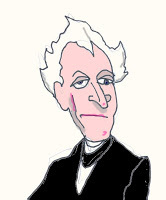 Andrew Jackson
Andrew Jackson
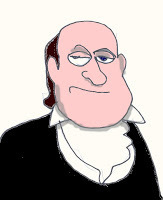 William Crawford After the Era of Good Feelings, an Era of Bad Feelings naturally ensued. No one called it that, but that's what it was, and it was pretty much inevitable. If you name something the Era of Good Feelings, you're just asking for trouble. It's like saying, "This is the Era of My Girlfriend Not Breaking Up With Me," or "This is the Era Before Cockroaches Take Over the Earth." Anyway. The Democratic-Republicans hadn't been out of office since Jefferson, and so after all that unity, the party finally split into four. The official caucus nominated William Crawford, but a lot of people were put out by this and felt they hadn't gotten as say-so. The next thing you know, everybody and his brother was running for president. 1
William Crawford After the Era of Good Feelings, an Era of Bad Feelings naturally ensued. No one called it that, but that's what it was, and it was pretty much inevitable. If you name something the Era of Good Feelings, you're just asking for trouble. It's like saying, "This is the Era of My Girlfriend Not Breaking Up With Me," or "This is the Era Before Cockroaches Take Over the Earth." Anyway. The Democratic-Republicans hadn't been out of office since Jefferson, and so after all that unity, the party finally split into four. The official caucus nominated William Crawford, but a lot of people were put out by this and felt they hadn't gotten as say-so. The next thing you know, everybody and his brother was running for president. 1
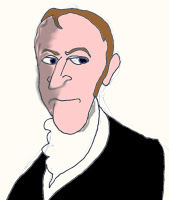 Henry ClayThe Federalists, if there were any of them left around, must've been saying, "I told you so! This is what happens when you go around admitting states left and right!" Two of the candidates were from Tennessee and Kentucky, which as far as a lot of people were concerned scarcely counted as real places, let alone states. Because the vote was split four ways, nobody got a clear majority, so it was left to the House of Representatives to decide the election between the three front-runners. Jackson had won the most electoral votes, but Henry Clay – who'd come in fourth, and just so happened to be speaker of the House – threw his support to Adams, and so J Q became the second president from Massachusetts, as well as the second Adams. John Adams, the elder, who was still alive and kicking - or alive at any rate - must've felt so proud to see his son ascend to the White House with a whopping 31% of the electoral vote. Naturally, there were accusations of fraud, and that Adams had paid Clay off, but this is raw calumny. Clay hated Jackson anyways, and once said, "I cannot believe that killing 2,500 Englishmen at New Orleans qualifies for the various, difficult, and complicated duties of the Chief Magistracy." 2
Henry ClayThe Federalists, if there were any of them left around, must've been saying, "I told you so! This is what happens when you go around admitting states left and right!" Two of the candidates were from Tennessee and Kentucky, which as far as a lot of people were concerned scarcely counted as real places, let alone states. Because the vote was split four ways, nobody got a clear majority, so it was left to the House of Representatives to decide the election between the three front-runners. Jackson had won the most electoral votes, but Henry Clay – who'd come in fourth, and just so happened to be speaker of the House – threw his support to Adams, and so J Q became the second president from Massachusetts, as well as the second Adams. John Adams, the elder, who was still alive and kicking - or alive at any rate - must've felt so proud to see his son ascend to the White House with a whopping 31% of the electoral vote. Naturally, there were accusations of fraud, and that Adams had paid Clay off, but this is raw calumny. Clay hated Jackson anyways, and once said, "I cannot believe that killing 2,500 Englishmen at New Orleans qualifies for the various, difficult, and complicated duties of the Chief Magistracy." 2
The Results
John Quincy Adams: 84Andrew Jackson: 99William Crawford: 41Henry Clay: 37
1. Actually, this is hyperbole. The brother wasn't running.2. In fact, Jackson was far less qualified than even Clay suspected. A mere 365 British were confirmed killed in the Battle of New Orleans. As a point of reference, George Washington, whom everyone agreed was extremely qualified, killed 1,505 British in Boston alone.

 Andrew Jackson
Andrew Jackson  William Crawford After the Era of Good Feelings, an Era of Bad Feelings naturally ensued. No one called it that, but that's what it was, and it was pretty much inevitable. If you name something the Era of Good Feelings, you're just asking for trouble. It's like saying, "This is the Era of My Girlfriend Not Breaking Up With Me," or "This is the Era Before Cockroaches Take Over the Earth." Anyway. The Democratic-Republicans hadn't been out of office since Jefferson, and so after all that unity, the party finally split into four. The official caucus nominated William Crawford, but a lot of people were put out by this and felt they hadn't gotten as say-so. The next thing you know, everybody and his brother was running for president. 1
William Crawford After the Era of Good Feelings, an Era of Bad Feelings naturally ensued. No one called it that, but that's what it was, and it was pretty much inevitable. If you name something the Era of Good Feelings, you're just asking for trouble. It's like saying, "This is the Era of My Girlfriend Not Breaking Up With Me," or "This is the Era Before Cockroaches Take Over the Earth." Anyway. The Democratic-Republicans hadn't been out of office since Jefferson, and so after all that unity, the party finally split into four. The official caucus nominated William Crawford, but a lot of people were put out by this and felt they hadn't gotten as say-so. The next thing you know, everybody and his brother was running for president. 1  Henry ClayThe Federalists, if there were any of them left around, must've been saying, "I told you so! This is what happens when you go around admitting states left and right!" Two of the candidates were from Tennessee and Kentucky, which as far as a lot of people were concerned scarcely counted as real places, let alone states. Because the vote was split four ways, nobody got a clear majority, so it was left to the House of Representatives to decide the election between the three front-runners. Jackson had won the most electoral votes, but Henry Clay – who'd come in fourth, and just so happened to be speaker of the House – threw his support to Adams, and so J Q became the second president from Massachusetts, as well as the second Adams. John Adams, the elder, who was still alive and kicking - or alive at any rate - must've felt so proud to see his son ascend to the White House with a whopping 31% of the electoral vote. Naturally, there were accusations of fraud, and that Adams had paid Clay off, but this is raw calumny. Clay hated Jackson anyways, and once said, "I cannot believe that killing 2,500 Englishmen at New Orleans qualifies for the various, difficult, and complicated duties of the Chief Magistracy." 2
Henry ClayThe Federalists, if there were any of them left around, must've been saying, "I told you so! This is what happens when you go around admitting states left and right!" Two of the candidates were from Tennessee and Kentucky, which as far as a lot of people were concerned scarcely counted as real places, let alone states. Because the vote was split four ways, nobody got a clear majority, so it was left to the House of Representatives to decide the election between the three front-runners. Jackson had won the most electoral votes, but Henry Clay – who'd come in fourth, and just so happened to be speaker of the House – threw his support to Adams, and so J Q became the second president from Massachusetts, as well as the second Adams. John Adams, the elder, who was still alive and kicking - or alive at any rate - must've felt so proud to see his son ascend to the White House with a whopping 31% of the electoral vote. Naturally, there were accusations of fraud, and that Adams had paid Clay off, but this is raw calumny. Clay hated Jackson anyways, and once said, "I cannot believe that killing 2,500 Englishmen at New Orleans qualifies for the various, difficult, and complicated duties of the Chief Magistracy." 2 The Results
John Quincy Adams: 84Andrew Jackson: 99William Crawford: 41Henry Clay: 37
1. Actually, this is hyperbole. The brother wasn't running.2. In fact, Jackson was far less qualified than even Clay suspected. A mere 365 British were confirmed killed in the Battle of New Orleans. As a point of reference, George Washington, whom everyone agreed was extremely qualified, killed 1,505 British in Boston alone.
Published on February 09, 2012 02:39
February 8, 2012
February 8 Presidential Losers: John Quincy Adams
Presidential Loser #8: John Quincy Adams, 1820
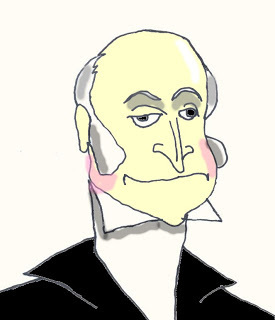 1820, still awash in the Era of Good Feelings (Isn't that a great name? Wouldn't you like to live in the Era of Good Feelings instead of the Me Generation or the Decade of Greed?), all Federalist opposition had evaporated and James Monroe ran unopposed. There wasn't even another candidate running against him. He just said, "I think I'd like being president," and the country said, "Okey-doke." The whole country EXCEPT one rogue elector named William Plumer who cast his vote for John Quincy Adams, the son of Presidential loser #3, John Adams. The popular legend is Plumer dissented because he felt only George Washington should deserve the honor of a unanimous election, which is just the sort of rumor you'd expect to go around during the Era of Good Feelings. (Doesn't that story just make you feel good?) The truth is, Plumer just didn't like Monroe: casting one useless vote for Adams was like serving someone a seven-course meal and spitting in the appetizer. Plumer, founder of the New Hampshire Historical Society and author of over a dozen books, including such page-turning classics as The Substance of an Argument Against the Indiscriminate Incorporation of Churches and Religious Societies, and Young Children May Be Truly Pious, inveighed against the "wasteful extravagance" of the previous Monroe administration. This probably had to do with the wasteful and extravagant way Monroe kpet admitting states to the Union – he admitted a total of five over two terms as president – diluting the political power of tiny New Hampshire. Get over it, New Hampshire, you still have the Primary. Plumer's other great achievement was seeing to it that fellow New Englander John Quincy Adams would go down in history as the biggest loser up to that time in a presidential elections.
1820, still awash in the Era of Good Feelings (Isn't that a great name? Wouldn't you like to live in the Era of Good Feelings instead of the Me Generation or the Decade of Greed?), all Federalist opposition had evaporated and James Monroe ran unopposed. There wasn't even another candidate running against him. He just said, "I think I'd like being president," and the country said, "Okey-doke." The whole country EXCEPT one rogue elector named William Plumer who cast his vote for John Quincy Adams, the son of Presidential loser #3, John Adams. The popular legend is Plumer dissented because he felt only George Washington should deserve the honor of a unanimous election, which is just the sort of rumor you'd expect to go around during the Era of Good Feelings. (Doesn't that story just make you feel good?) The truth is, Plumer just didn't like Monroe: casting one useless vote for Adams was like serving someone a seven-course meal and spitting in the appetizer. Plumer, founder of the New Hampshire Historical Society and author of over a dozen books, including such page-turning classics as The Substance of an Argument Against the Indiscriminate Incorporation of Churches and Religious Societies, and Young Children May Be Truly Pious, inveighed against the "wasteful extravagance" of the previous Monroe administration. This probably had to do with the wasteful and extravagant way Monroe kpet admitting states to the Union – he admitted a total of five over two terms as president – diluting the political power of tiny New Hampshire. Get over it, New Hampshire, you still have the Primary. Plumer's other great achievement was seeing to it that fellow New Englander John Quincy Adams would go down in history as the biggest loser up to that time in a presidential elections.
Result
James Monroe: 230John Quincy Adams: 1
(In fairness, some people maintain Adams did not really lose by the whopping 229 electoral votes shown here because the votes from the new state of Missouri might not have been valid. In that case, Monroe would have squeaked by with a mere 226-vote margin.)

 1820, still awash in the Era of Good Feelings (Isn't that a great name? Wouldn't you like to live in the Era of Good Feelings instead of the Me Generation or the Decade of Greed?), all Federalist opposition had evaporated and James Monroe ran unopposed. There wasn't even another candidate running against him. He just said, "I think I'd like being president," and the country said, "Okey-doke." The whole country EXCEPT one rogue elector named William Plumer who cast his vote for John Quincy Adams, the son of Presidential loser #3, John Adams. The popular legend is Plumer dissented because he felt only George Washington should deserve the honor of a unanimous election, which is just the sort of rumor you'd expect to go around during the Era of Good Feelings. (Doesn't that story just make you feel good?) The truth is, Plumer just didn't like Monroe: casting one useless vote for Adams was like serving someone a seven-course meal and spitting in the appetizer. Plumer, founder of the New Hampshire Historical Society and author of over a dozen books, including such page-turning classics as The Substance of an Argument Against the Indiscriminate Incorporation of Churches and Religious Societies, and Young Children May Be Truly Pious, inveighed against the "wasteful extravagance" of the previous Monroe administration. This probably had to do with the wasteful and extravagant way Monroe kpet admitting states to the Union – he admitted a total of five over two terms as president – diluting the political power of tiny New Hampshire. Get over it, New Hampshire, you still have the Primary. Plumer's other great achievement was seeing to it that fellow New Englander John Quincy Adams would go down in history as the biggest loser up to that time in a presidential elections.
1820, still awash in the Era of Good Feelings (Isn't that a great name? Wouldn't you like to live in the Era of Good Feelings instead of the Me Generation or the Decade of Greed?), all Federalist opposition had evaporated and James Monroe ran unopposed. There wasn't even another candidate running against him. He just said, "I think I'd like being president," and the country said, "Okey-doke." The whole country EXCEPT one rogue elector named William Plumer who cast his vote for John Quincy Adams, the son of Presidential loser #3, John Adams. The popular legend is Plumer dissented because he felt only George Washington should deserve the honor of a unanimous election, which is just the sort of rumor you'd expect to go around during the Era of Good Feelings. (Doesn't that story just make you feel good?) The truth is, Plumer just didn't like Monroe: casting one useless vote for Adams was like serving someone a seven-course meal and spitting in the appetizer. Plumer, founder of the New Hampshire Historical Society and author of over a dozen books, including such page-turning classics as The Substance of an Argument Against the Indiscriminate Incorporation of Churches and Religious Societies, and Young Children May Be Truly Pious, inveighed against the "wasteful extravagance" of the previous Monroe administration. This probably had to do with the wasteful and extravagant way Monroe kpet admitting states to the Union – he admitted a total of five over two terms as president – diluting the political power of tiny New Hampshire. Get over it, New Hampshire, you still have the Primary. Plumer's other great achievement was seeing to it that fellow New Englander John Quincy Adams would go down in history as the biggest loser up to that time in a presidential elections. Result
James Monroe: 230John Quincy Adams: 1
(In fairness, some people maintain Adams did not really lose by the whopping 229 electoral votes shown here because the votes from the new state of Missouri might not have been valid. In that case, Monroe would have squeaked by with a mere 226-vote margin.)
Published on February 08, 2012 02:31
February 7, 2012
February 7 Presidential Losers: Rufus King
Presidential Loser #7: Rufus King, 1816
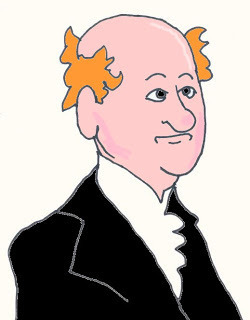 By 1816, the Federalists were in such disarray, they couldn't even summon the organizational gumption to hold a caucus, so Rufus King, two-timer loser for VP, became the default candidate for anybody who just didn't want to vote for Monroe. Too bad for Rufus, theren't were many of these people, because this was the Era of Good Feelings, a strange thing since The War of 1812 had been pretty much a disaster for the US.
By 1816, the Federalists were in such disarray, they couldn't even summon the organizational gumption to hold a caucus, so Rufus King, two-timer loser for VP, became the default candidate for anybody who just didn't want to vote for Monroe. Too bad for Rufus, theren't were many of these people, because this was the Era of Good Feelings, a strange thing since The War of 1812 had been pretty much a disaster for the US.
All the parties involved later claimed victory, but the British had burned Washington and forced the president to flee for his life, and if war is a matter of keeping score, the Americans lost about 2,200 lives, and the British only lost about 1,600. We did get some great songs out of the war: a lawyer named Francis Scott Key was inspired to compose a poem about the bombardment of Ft McHenry, 1 and the Battle of New Orleans inspired a pop tune by the same name in the 20th Century. To be fair, the Battle of New Orleans was fought in extra innings since peace had already broken out, but it still elevated the stature of Andrew Jackson, and – as I have said earlier – made for a great song. But even if the War of 1812 ended in a tie, folks were pretty content with the way things stood, so all in all, poor Rufus never had a chance.
The Result
James Monroe: 183Rufus King: 34
1. The title of the poem was "The Defense of Fort McHenry," and it was later given the (much better) name of "The Star Spangled Banner" and set to an unsingable melody to become our national anthem. Every school child knows the melody was originally a British drinking song, but what they don't know is what an unendurably lame drinking song. The lyrics in part run thus:
To Anacreon in heaven where he sat in full glee,A few sons of harmony sent a petition,
That he their inspirer and patron would be,
When this answer arrived from the jolly old Grecian:
Voice, fiddle aud flute, no longer be mute,
I'll lend you my name and inspire you to boot!
And besides I'll instruct you like me to entwine
The myrtle of Venus and Bacchus's vine.

 By 1816, the Federalists were in such disarray, they couldn't even summon the organizational gumption to hold a caucus, so Rufus King, two-timer loser for VP, became the default candidate for anybody who just didn't want to vote for Monroe. Too bad for Rufus, theren't were many of these people, because this was the Era of Good Feelings, a strange thing since The War of 1812 had been pretty much a disaster for the US.
By 1816, the Federalists were in such disarray, they couldn't even summon the organizational gumption to hold a caucus, so Rufus King, two-timer loser for VP, became the default candidate for anybody who just didn't want to vote for Monroe. Too bad for Rufus, theren't were many of these people, because this was the Era of Good Feelings, a strange thing since The War of 1812 had been pretty much a disaster for the US. All the parties involved later claimed victory, but the British had burned Washington and forced the president to flee for his life, and if war is a matter of keeping score, the Americans lost about 2,200 lives, and the British only lost about 1,600. We did get some great songs out of the war: a lawyer named Francis Scott Key was inspired to compose a poem about the bombardment of Ft McHenry, 1 and the Battle of New Orleans inspired a pop tune by the same name in the 20th Century. To be fair, the Battle of New Orleans was fought in extra innings since peace had already broken out, but it still elevated the stature of Andrew Jackson, and – as I have said earlier – made for a great song. But even if the War of 1812 ended in a tie, folks were pretty content with the way things stood, so all in all, poor Rufus never had a chance.
The Result
James Monroe: 183Rufus King: 34
1. The title of the poem was "The Defense of Fort McHenry," and it was later given the (much better) name of "The Star Spangled Banner" and set to an unsingable melody to become our national anthem. Every school child knows the melody was originally a British drinking song, but what they don't know is what an unendurably lame drinking song. The lyrics in part run thus:
To Anacreon in heaven where he sat in full glee,A few sons of harmony sent a petition,
That he their inspirer and patron would be,
When this answer arrived from the jolly old Grecian:
Voice, fiddle aud flute, no longer be mute,
I'll lend you my name and inspire you to boot!
And besides I'll instruct you like me to entwine
The myrtle of Venus and Bacchus's vine.
Published on February 07, 2012 02:24
February 6, 2012
February 6 Presidential Losers: DeWitt Clinton
DeWitt Clinton, 1812
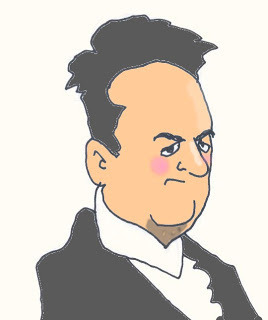 After two blow-outs against Charles Cotesworth Pinckney, the Democratic-Republican Party found tougher opposition against Dewitt Clinton. Madison, the incumbent, must've felt a little piqued at the fact DeWitt was the nephew of his own former Veep, George Clinton. Wikipedia says DeWitt Clinton was a Federalist, but that's just silly talk. Clinton was a Clintonian, an ad hoc party slapped together around him by Madison's enemies. DeWitt was nominated by a rogue caucus (rogue caucus – there's a pair of words you never see together) of Democratic-Republicans who were upset because they felt Madison had dragged his feet over getting us into the War of 1812. (This was a completely unfair accusation, because I checked the facts, and the War of 1812 started right on schedule.) I cannot express how sad I find it that we never had a DeWitt in the White House, but that's the way it is. We had our chance at a Cotesworth and a Rufus, too, and we blew it then as well.
After two blow-outs against Charles Cotesworth Pinckney, the Democratic-Republican Party found tougher opposition against Dewitt Clinton. Madison, the incumbent, must've felt a little piqued at the fact DeWitt was the nephew of his own former Veep, George Clinton. Wikipedia says DeWitt Clinton was a Federalist, but that's just silly talk. Clinton was a Clintonian, an ad hoc party slapped together around him by Madison's enemies. DeWitt was nominated by a rogue caucus (rogue caucus – there's a pair of words you never see together) of Democratic-Republicans who were upset because they felt Madison had dragged his feet over getting us into the War of 1812. (This was a completely unfair accusation, because I checked the facts, and the War of 1812 started right on schedule.) I cannot express how sad I find it that we never had a DeWitt in the White House, but that's the way it is. We had our chance at a Cotesworth and a Rufus, too, and we blew it then as well.
Results
James Madison: 128DeWitt Clinton: 88

 After two blow-outs against Charles Cotesworth Pinckney, the Democratic-Republican Party found tougher opposition against Dewitt Clinton. Madison, the incumbent, must've felt a little piqued at the fact DeWitt was the nephew of his own former Veep, George Clinton. Wikipedia says DeWitt Clinton was a Federalist, but that's just silly talk. Clinton was a Clintonian, an ad hoc party slapped together around him by Madison's enemies. DeWitt was nominated by a rogue caucus (rogue caucus – there's a pair of words you never see together) of Democratic-Republicans who were upset because they felt Madison had dragged his feet over getting us into the War of 1812. (This was a completely unfair accusation, because I checked the facts, and the War of 1812 started right on schedule.) I cannot express how sad I find it that we never had a DeWitt in the White House, but that's the way it is. We had our chance at a Cotesworth and a Rufus, too, and we blew it then as well.
After two blow-outs against Charles Cotesworth Pinckney, the Democratic-Republican Party found tougher opposition against Dewitt Clinton. Madison, the incumbent, must've felt a little piqued at the fact DeWitt was the nephew of his own former Veep, George Clinton. Wikipedia says DeWitt Clinton was a Federalist, but that's just silly talk. Clinton was a Clintonian, an ad hoc party slapped together around him by Madison's enemies. DeWitt was nominated by a rogue caucus (rogue caucus – there's a pair of words you never see together) of Democratic-Republicans who were upset because they felt Madison had dragged his feet over getting us into the War of 1812. (This was a completely unfair accusation, because I checked the facts, and the War of 1812 started right on schedule.) I cannot express how sad I find it that we never had a DeWitt in the White House, but that's the way it is. We had our chance at a Cotesworth and a Rufus, too, and we blew it then as well.Results
James Madison: 128DeWitt Clinton: 88
Published on February 06, 2012 02:20
February 5, 2012
February 5, Presidential Losers, Charles Cotesworth Pinckney
Charles Cotesworth Pinckney, 1808
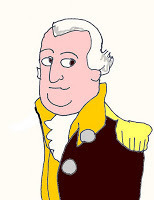 Charles Cotesworth Pinckney One thing you can say about Ol' Pinckney: he was no quitter. He lost in big in 1804, and by golly, he came right back in 1808 and lost big again. He even stuck with his same running mate, determined that someone named Rufus would be in the executive branch. He didn't lose quite as big this time; he was helped by a trade embargo that had pissed off the New England States. Also, the Democratic-Republican candidate James Madison wasn't quite the superstar Jefferson had been. Pinckney never ran again, I'm sorry to say. But… on July 4, 1726 – precisely half a century after the signing of the Declaration of Independence – former presidents, long-time rivals, and founding fathers, John Adams and Thomas Jefferson both died, neither one probably aware that Charles Cotesworth Pinckney had also died, exactly eleven months and nineteen days earlier: August 1, 1825! Coincidence? I'll let you decide.
Charles Cotesworth Pinckney One thing you can say about Ol' Pinckney: he was no quitter. He lost in big in 1804, and by golly, he came right back in 1808 and lost big again. He even stuck with his same running mate, determined that someone named Rufus would be in the executive branch. He didn't lose quite as big this time; he was helped by a trade embargo that had pissed off the New England States. Also, the Democratic-Republican candidate James Madison wasn't quite the superstar Jefferson had been. Pinckney never ran again, I'm sorry to say. But… on July 4, 1726 – precisely half a century after the signing of the Declaration of Independence – former presidents, long-time rivals, and founding fathers, John Adams and Thomas Jefferson both died, neither one probably aware that Charles Cotesworth Pinckney had also died, exactly eleven months and nineteen days earlier: August 1, 1825! Coincidence? I'll let you decide.
Results
James Madison: 122Charles Cotesworth Pinckney: 47
 Charles Cotesworth Pinckney One thing you can say about Ol' Pinckney: he was no quitter. He lost in big in 1804, and by golly, he came right back in 1808 and lost big again. He even stuck with his same running mate, determined that someone named Rufus would be in the executive branch. He didn't lose quite as big this time; he was helped by a trade embargo that had pissed off the New England States. Also, the Democratic-Republican candidate James Madison wasn't quite the superstar Jefferson had been. Pinckney never ran again, I'm sorry to say. But… on July 4, 1726 – precisely half a century after the signing of the Declaration of Independence – former presidents, long-time rivals, and founding fathers, John Adams and Thomas Jefferson both died, neither one probably aware that Charles Cotesworth Pinckney had also died, exactly eleven months and nineteen days earlier: August 1, 1825! Coincidence? I'll let you decide.
Charles Cotesworth Pinckney One thing you can say about Ol' Pinckney: he was no quitter. He lost in big in 1804, and by golly, he came right back in 1808 and lost big again. He even stuck with his same running mate, determined that someone named Rufus would be in the executive branch. He didn't lose quite as big this time; he was helped by a trade embargo that had pissed off the New England States. Also, the Democratic-Republican candidate James Madison wasn't quite the superstar Jefferson had been. Pinckney never ran again, I'm sorry to say. But… on July 4, 1726 – precisely half a century after the signing of the Declaration of Independence – former presidents, long-time rivals, and founding fathers, John Adams and Thomas Jefferson both died, neither one probably aware that Charles Cotesworth Pinckney had also died, exactly eleven months and nineteen days earlier: August 1, 1825! Coincidence? I'll let you decide. Results
James Madison: 122Charles Cotesworth Pinckney: 47
Published on February 05, 2012 03:15
February 4, 2012
February 4 Presidential Losers: Charles Cotesworth Pinckney
Charles Cotesworth Pinckney, 1804
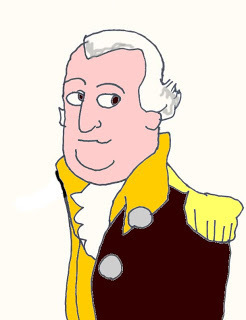 After two, acrimonious, partisan, edge-of-your seat elections, the US needed someone to ensure a good yawn-inducing
After two, acrimonious, partisan, edge-of-your seat elections, the US needed someone to ensure a good yawn-inducing
campaign, and Pinckney was the man for the job. Somehow even his impressive record as a general and prisoner of war during the American Revolution wasn't enough to engender excitement. (Of course it didn't help to be running against the author of the Declaration of Independence.) Even the name: Pinckney. It not only sounds funny, it's one of those names that after you write it, you have to go back and check your spelling. Which explains why his parents named him Cotesworth. They probably figured, "Hell, his last name is already Pinckney. We can't make it any worse." His running mate was even better: Rufus King of New York. Why can't we have someone named Rufus in the executive branch? It would not be strictly accurate to say the Federalists "threw" their support behind Pinckney – "tossed" might be closer, or even "dropped." In 1804, the Federalist Party was too demoralized even to hold a caucus. There were three hot-button issues, or, for the election of 1804, maybe tepid-button issues would be the mot juste. For one, the scandal had broken about Jefferson's affair with Sally Heming. Social conservatives were scandalized at the thought of their president making mattress magic with a black woman. The thought of a president owning a black woman didn't seem to trouble them. The other issue was the Louisiana Purchase, which the Federalists argued was unconstitutional. They had a good point, but when the president doubles the size of the country by writing a check, carping about constitutionality seems like sour grapes. The Indians in the new territory might have had something to say about it, but they didn't show up to vote. The other thing, which seems like it should have been a bigger issue than it turned out to be, was that the Vice President Aaron Burr shot and killed political rival Alexander Hamilton. (Those were the days - don't bother with a smear campaign, just pop a cap in his ass!) Having a murderer as veep didn't make Jefferson's Democratic-Republican Party weaker, if anything, the Democrat-Republicans became unstoppable after this. (In those days, people appreciated a good shot. Dick Cheney was another Vice President who shot someone in office, but that's not the same thing, because he wasn't aiming.) The result was a landslide with Cotesworth and Rufus underneath it.
Result
Thomas Jefferson: 162Charles Cotesworth Pinckney: 14

 After two, acrimonious, partisan, edge-of-your seat elections, the US needed someone to ensure a good yawn-inducing
After two, acrimonious, partisan, edge-of-your seat elections, the US needed someone to ensure a good yawn-inducing campaign, and Pinckney was the man for the job. Somehow even his impressive record as a general and prisoner of war during the American Revolution wasn't enough to engender excitement. (Of course it didn't help to be running against the author of the Declaration of Independence.) Even the name: Pinckney. It not only sounds funny, it's one of those names that after you write it, you have to go back and check your spelling. Which explains why his parents named him Cotesworth. They probably figured, "Hell, his last name is already Pinckney. We can't make it any worse." His running mate was even better: Rufus King of New York. Why can't we have someone named Rufus in the executive branch? It would not be strictly accurate to say the Federalists "threw" their support behind Pinckney – "tossed" might be closer, or even "dropped." In 1804, the Federalist Party was too demoralized even to hold a caucus. There were three hot-button issues, or, for the election of 1804, maybe tepid-button issues would be the mot juste. For one, the scandal had broken about Jefferson's affair with Sally Heming. Social conservatives were scandalized at the thought of their president making mattress magic with a black woman. The thought of a president owning a black woman didn't seem to trouble them. The other issue was the Louisiana Purchase, which the Federalists argued was unconstitutional. They had a good point, but when the president doubles the size of the country by writing a check, carping about constitutionality seems like sour grapes. The Indians in the new territory might have had something to say about it, but they didn't show up to vote. The other thing, which seems like it should have been a bigger issue than it turned out to be, was that the Vice President Aaron Burr shot and killed political rival Alexander Hamilton. (Those were the days - don't bother with a smear campaign, just pop a cap in his ass!) Having a murderer as veep didn't make Jefferson's Democratic-Republican Party weaker, if anything, the Democrat-Republicans became unstoppable after this. (In those days, people appreciated a good shot. Dick Cheney was another Vice President who shot someone in office, but that's not the same thing, because he wasn't aiming.) The result was a landslide with Cotesworth and Rufus underneath it.
Result
Thomas Jefferson: 162Charles Cotesworth Pinckney: 14
Published on February 04, 2012 03:08
February 3, 2012
February 3 Presidential Losers: John Adams
John Adams, 1800
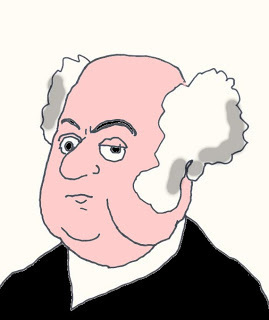 Another squeaker. Aaron Burr was Jefferson's running mate, but got the same number of electoral votes as Jefferson, so the House of Representatives had to decide who would be president: we only missed having a duelist as president by a procedural technicality. Instead we got another slave owner. The Federalists – John Adams' side – said Jefferson and the Democratic-Republicans 1 were a passel of radicals out to overthrow the country. George Washington himself said, "you could as soon scrub the blackamoor white, as to change the principles of a professed Democrat; and that he will leave nothing unattempted to overturn the Government of this Country." These days, of course, political figures don't compare each other to "blackamores;" we're too high-toned for that. We just stick to saying someone's secretly Muslim. As for the Democratic-Republicans, they claimed Adams was pro-British. Another sore point was his administration had enacted the Alien and Sedition Acts which were sort of the Eighteenth Century version of Homeland Security. Homeland Security is a much nicer-sounding name, but we were a new country and weren't as good at euphemisms in those days. The Sedition Act made it an offense to write "scadalously" about the government or certain officials. Since the act was set to expire the day before Adam's term ended, it wasn't hard to guess who those certain officials were. One man was fined a hundred dollars for remarking he didn't care if Adams got shot in the ass by a cannon. The Alien and Sedition Acts also allowed the president to deport any resident aliens if the US were at war with their home country. This one's still in effect, and it's come in really handy, I can tell you, but these legislative accomplishments weren't enough to keep Adams in for a second term. Burr's support proved pivotal in swinging New York's electoral votes into the Democratic-Republican camp.
Another squeaker. Aaron Burr was Jefferson's running mate, but got the same number of electoral votes as Jefferson, so the House of Representatives had to decide who would be president: we only missed having a duelist as president by a procedural technicality. Instead we got another slave owner. The Federalists – John Adams' side – said Jefferson and the Democratic-Republicans 1 were a passel of radicals out to overthrow the country. George Washington himself said, "you could as soon scrub the blackamoor white, as to change the principles of a professed Democrat; and that he will leave nothing unattempted to overturn the Government of this Country." These days, of course, political figures don't compare each other to "blackamores;" we're too high-toned for that. We just stick to saying someone's secretly Muslim. As for the Democratic-Republicans, they claimed Adams was pro-British. Another sore point was his administration had enacted the Alien and Sedition Acts which were sort of the Eighteenth Century version of Homeland Security. Homeland Security is a much nicer-sounding name, but we were a new country and weren't as good at euphemisms in those days. The Sedition Act made it an offense to write "scadalously" about the government or certain officials. Since the act was set to expire the day before Adam's term ended, it wasn't hard to guess who those certain officials were. One man was fined a hundred dollars for remarking he didn't care if Adams got shot in the ass by a cannon. The Alien and Sedition Acts also allowed the president to deport any resident aliens if the US were at war with their home country. This one's still in effect, and it's come in really handy, I can tell you, but these legislative accomplishments weren't enough to keep Adams in for a second term. Burr's support proved pivotal in swinging New York's electoral votes into the Democratic-Republican camp.
Result
Thomas Jefferson: 73John Adams: 65
1. This was before bumper-stickers, and names didn't have to be as pithy.

 Another squeaker. Aaron Burr was Jefferson's running mate, but got the same number of electoral votes as Jefferson, so the House of Representatives had to decide who would be president: we only missed having a duelist as president by a procedural technicality. Instead we got another slave owner. The Federalists – John Adams' side – said Jefferson and the Democratic-Republicans 1 were a passel of radicals out to overthrow the country. George Washington himself said, "you could as soon scrub the blackamoor white, as to change the principles of a professed Democrat; and that he will leave nothing unattempted to overturn the Government of this Country." These days, of course, political figures don't compare each other to "blackamores;" we're too high-toned for that. We just stick to saying someone's secretly Muslim. As for the Democratic-Republicans, they claimed Adams was pro-British. Another sore point was his administration had enacted the Alien and Sedition Acts which were sort of the Eighteenth Century version of Homeland Security. Homeland Security is a much nicer-sounding name, but we were a new country and weren't as good at euphemisms in those days. The Sedition Act made it an offense to write "scadalously" about the government or certain officials. Since the act was set to expire the day before Adam's term ended, it wasn't hard to guess who those certain officials were. One man was fined a hundred dollars for remarking he didn't care if Adams got shot in the ass by a cannon. The Alien and Sedition Acts also allowed the president to deport any resident aliens if the US were at war with their home country. This one's still in effect, and it's come in really handy, I can tell you, but these legislative accomplishments weren't enough to keep Adams in for a second term. Burr's support proved pivotal in swinging New York's electoral votes into the Democratic-Republican camp.
Another squeaker. Aaron Burr was Jefferson's running mate, but got the same number of electoral votes as Jefferson, so the House of Representatives had to decide who would be president: we only missed having a duelist as president by a procedural technicality. Instead we got another slave owner. The Federalists – John Adams' side – said Jefferson and the Democratic-Republicans 1 were a passel of radicals out to overthrow the country. George Washington himself said, "you could as soon scrub the blackamoor white, as to change the principles of a professed Democrat; and that he will leave nothing unattempted to overturn the Government of this Country." These days, of course, political figures don't compare each other to "blackamores;" we're too high-toned for that. We just stick to saying someone's secretly Muslim. As for the Democratic-Republicans, they claimed Adams was pro-British. Another sore point was his administration had enacted the Alien and Sedition Acts which were sort of the Eighteenth Century version of Homeland Security. Homeland Security is a much nicer-sounding name, but we were a new country and weren't as good at euphemisms in those days. The Sedition Act made it an offense to write "scadalously" about the government or certain officials. Since the act was set to expire the day before Adam's term ended, it wasn't hard to guess who those certain officials were. One man was fined a hundred dollars for remarking he didn't care if Adams got shot in the ass by a cannon. The Alien and Sedition Acts also allowed the president to deport any resident aliens if the US were at war with their home country. This one's still in effect, and it's come in really handy, I can tell you, but these legislative accomplishments weren't enough to keep Adams in for a second term. Burr's support proved pivotal in swinging New York's electoral votes into the Democratic-Republican camp.Result
Thomas Jefferson: 73John Adams: 65
1. This was before bumper-stickers, and names didn't have to be as pithy.
Published on February 03, 2012 02:34
February 2, 2012
February 2 Presidential Losers: Thomas Jefferson,
Presidential Loser #2: Thomas Jefferson 1796
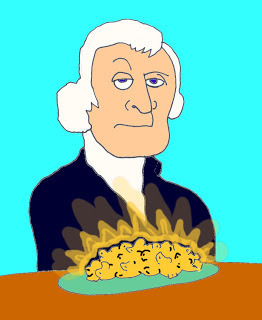 The United States' first contested presidential election was a real nail-biter. Thomas Jefferson and John Adams, once fast friends, had turned on each other. Standards of the time meant the candidates themselves had to refrain from open campaigning, but this did not apply to their supporters. The Jefferson camp called Adams a "hideous hermaphroditical character, which has neither the force and firmness of a man, nor the gentleness and sensibility of a woman," and Adams' supporters came back by calling Jefferson a "mean-spirited, low-lived fellow, the son of a half-breed squaw, sired by a Virginia mulatto father." (The scandal over Jefferson's affair with a slave who was his late wife's half-sister did not surface until the next election.) Although the Democratic-Republicans made a sound alliterative argument with "hideous hermaphroditical character," thoughtful electors were evidently swayed by the question of whether Jefferson's mother were indeed a half-breed squaw. That and the fact that all the New England states went to Adams was enough to decide the election. But the political invective did nothing to cement the friendship between the two men, and since according to the procedures of the time, the runner-up Jefferson would end up being Vice President, the campaign must've made for prickly relations in executive branch.
The United States' first contested presidential election was a real nail-biter. Thomas Jefferson and John Adams, once fast friends, had turned on each other. Standards of the time meant the candidates themselves had to refrain from open campaigning, but this did not apply to their supporters. The Jefferson camp called Adams a "hideous hermaphroditical character, which has neither the force and firmness of a man, nor the gentleness and sensibility of a woman," and Adams' supporters came back by calling Jefferson a "mean-spirited, low-lived fellow, the son of a half-breed squaw, sired by a Virginia mulatto father." (The scandal over Jefferson's affair with a slave who was his late wife's half-sister did not surface until the next election.) Although the Democratic-Republicans made a sound alliterative argument with "hideous hermaphroditical character," thoughtful electors were evidently swayed by the question of whether Jefferson's mother were indeed a half-breed squaw. That and the fact that all the New England states went to Adams was enough to decide the election. But the political invective did nothing to cement the friendship between the two men, and since according to the procedures of the time, the runner-up Jefferson would end up being Vice President, the campaign must've made for prickly relations in executive branch.
Statesman, architect, writer of the Declaration of Independence and inventor of macaroni and cheese, Jefferson lost the election by a mere three electoral votes.
The Result
John Adams: 71Thomas Jefferson: 68

 The United States' first contested presidential election was a real nail-biter. Thomas Jefferson and John Adams, once fast friends, had turned on each other. Standards of the time meant the candidates themselves had to refrain from open campaigning, but this did not apply to their supporters. The Jefferson camp called Adams a "hideous hermaphroditical character, which has neither the force and firmness of a man, nor the gentleness and sensibility of a woman," and Adams' supporters came back by calling Jefferson a "mean-spirited, low-lived fellow, the son of a half-breed squaw, sired by a Virginia mulatto father." (The scandal over Jefferson's affair with a slave who was his late wife's half-sister did not surface until the next election.) Although the Democratic-Republicans made a sound alliterative argument with "hideous hermaphroditical character," thoughtful electors were evidently swayed by the question of whether Jefferson's mother were indeed a half-breed squaw. That and the fact that all the New England states went to Adams was enough to decide the election. But the political invective did nothing to cement the friendship between the two men, and since according to the procedures of the time, the runner-up Jefferson would end up being Vice President, the campaign must've made for prickly relations in executive branch.
The United States' first contested presidential election was a real nail-biter. Thomas Jefferson and John Adams, once fast friends, had turned on each other. Standards of the time meant the candidates themselves had to refrain from open campaigning, but this did not apply to their supporters. The Jefferson camp called Adams a "hideous hermaphroditical character, which has neither the force and firmness of a man, nor the gentleness and sensibility of a woman," and Adams' supporters came back by calling Jefferson a "mean-spirited, low-lived fellow, the son of a half-breed squaw, sired by a Virginia mulatto father." (The scandal over Jefferson's affair with a slave who was his late wife's half-sister did not surface until the next election.) Although the Democratic-Republicans made a sound alliterative argument with "hideous hermaphroditical character," thoughtful electors were evidently swayed by the question of whether Jefferson's mother were indeed a half-breed squaw. That and the fact that all the New England states went to Adams was enough to decide the election. But the political invective did nothing to cement the friendship between the two men, and since according to the procedures of the time, the runner-up Jefferson would end up being Vice President, the campaign must've made for prickly relations in executive branch.Statesman, architect, writer of the Declaration of Independence and inventor of macaroni and cheese, Jefferson lost the election by a mere three electoral votes.
The Result
John Adams: 71Thomas Jefferson: 68
Published on February 02, 2012 02:39
February 1, 2012
February 1, Presidential Losers: John Hancock
Presidential Loser #1: John Hancock 1788
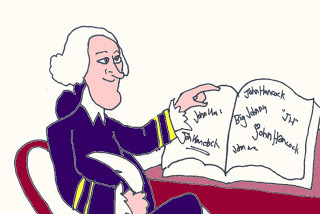 Technically, the first election for the President of the United States wasn't much of an election because George Washington ran unopposed, but John Hancock had already lost years before in 1775 when the Continental Congress selected the Commander in Chief for the Continental Army. People must've pretty much figured whoever led the army, assuming he didn't get himself killed, would someday probably also lead the country. Hancock, who was already President of the Congress, assumed he would get the nomination. John Adams records in his diary that Hancock had a big smirk on his face when Adams rose to give the nomination. Hancock and the Adams boys were tighter than a button-down shirt on a body builder, or at least they were up to that time. Adams gave his speech, building up with glowing praise their nascent country's leader and when he got to the name, "George Washington," Hancock looked like he'd just found a dead cat in his lap. Ever after that, Hancock's star was pretty much on the decline. He did do the thing with the fancy signature, on July 4, 1776 when he said in front of the other delegates, "King George will be able to read this without his spectacles." Except he never said that. He did sign on July 4, but that was just on the copy they sent off to the printers. He didn't get around to putting on his fancy signature until August.
Technically, the first election for the President of the United States wasn't much of an election because George Washington ran unopposed, but John Hancock had already lost years before in 1775 when the Continental Congress selected the Commander in Chief for the Continental Army. People must've pretty much figured whoever led the army, assuming he didn't get himself killed, would someday probably also lead the country. Hancock, who was already President of the Congress, assumed he would get the nomination. John Adams records in his diary that Hancock had a big smirk on his face when Adams rose to give the nomination. Hancock and the Adams boys were tighter than a button-down shirt on a body builder, or at least they were up to that time. Adams gave his speech, building up with glowing praise their nascent country's leader and when he got to the name, "George Washington," Hancock looked like he'd just found a dead cat in his lap. Ever after that, Hancock's star was pretty much on the decline. He did do the thing with the fancy signature, on July 4, 1776 when he said in front of the other delegates, "King George will be able to read this without his spectacles." Except he never said that. He did sign on July 4, but that was just on the copy they sent off to the printers. He didn't get around to putting on his fancy signature until August.
In 1788 not hoping to be president, Hancock allowed his name to be put forth for Vice President. He got a measly four electoral votes, none of them even from his own state of Massachusetts. Those had gone to John Adams, the man who'd done him dirty back in '75.
The Result
George Washington: 69
John Hancock: 4

 Technically, the first election for the President of the United States wasn't much of an election because George Washington ran unopposed, but John Hancock had already lost years before in 1775 when the Continental Congress selected the Commander in Chief for the Continental Army. People must've pretty much figured whoever led the army, assuming he didn't get himself killed, would someday probably also lead the country. Hancock, who was already President of the Congress, assumed he would get the nomination. John Adams records in his diary that Hancock had a big smirk on his face when Adams rose to give the nomination. Hancock and the Adams boys were tighter than a button-down shirt on a body builder, or at least they were up to that time. Adams gave his speech, building up with glowing praise their nascent country's leader and when he got to the name, "George Washington," Hancock looked like he'd just found a dead cat in his lap. Ever after that, Hancock's star was pretty much on the decline. He did do the thing with the fancy signature, on July 4, 1776 when he said in front of the other delegates, "King George will be able to read this without his spectacles." Except he never said that. He did sign on July 4, but that was just on the copy they sent off to the printers. He didn't get around to putting on his fancy signature until August.
Technically, the first election for the President of the United States wasn't much of an election because George Washington ran unopposed, but John Hancock had already lost years before in 1775 when the Continental Congress selected the Commander in Chief for the Continental Army. People must've pretty much figured whoever led the army, assuming he didn't get himself killed, would someday probably also lead the country. Hancock, who was already President of the Congress, assumed he would get the nomination. John Adams records in his diary that Hancock had a big smirk on his face when Adams rose to give the nomination. Hancock and the Adams boys were tighter than a button-down shirt on a body builder, or at least they were up to that time. Adams gave his speech, building up with glowing praise their nascent country's leader and when he got to the name, "George Washington," Hancock looked like he'd just found a dead cat in his lap. Ever after that, Hancock's star was pretty much on the decline. He did do the thing with the fancy signature, on July 4, 1776 when he said in front of the other delegates, "King George will be able to read this without his spectacles." Except he never said that. He did sign on July 4, but that was just on the copy they sent off to the printers. He didn't get around to putting on his fancy signature until August. In 1788 not hoping to be president, Hancock allowed his name to be put forth for Vice President. He got a measly four electoral votes, none of them even from his own state of Massachusetts. Those had gone to John Adams, the man who'd done him dirty back in '75.
The Result
George Washington: 69
John Hancock: 4
Published on February 01, 2012 03:02
January 31, 2012
STOOPID CONTEST January 31
 Can you guess the classic Sci-Fi movie represented by the cartoon below. Send your guess, along with your name and address, to manmartin@manmartin.net One entry, chosen at random from the correct answers will receive an autographed copy of the award-winning Days of the Endless Corvette, hand delivered to your hovel or basement apartment by a PAID REPRESENTATIVE OF THE US GOVERNMENT.
Can you guess the classic Sci-Fi movie represented by the cartoon below. Send your guess, along with your name and address, to manmartin@manmartin.net One entry, chosen at random from the correct answers will receive an autographed copy of the award-winning Days of the Endless Corvette, hand delivered to your hovel or basement apartment by a PAID REPRESENTATIVE OF THE US GOVERNMENT. "... and this one was removed from Angelina Jolie's left buttock."
"... and this one was removed from Angelina Jolie's left buttock."The winner of last month's contest was Paul Vincent of Winnipeg, Canada. Paul says the problem with fog is it never comes on a clear day when you can get a good look at it. Paul wins a copy of Paradise Dogs.
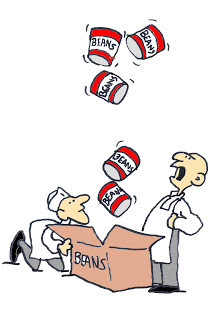 Dang it! It's the same thing every time!
Dang it! It's the same thing every time!Answer: The Unbearable Lightness of Beans.
Published on January 31, 2012 02:16



